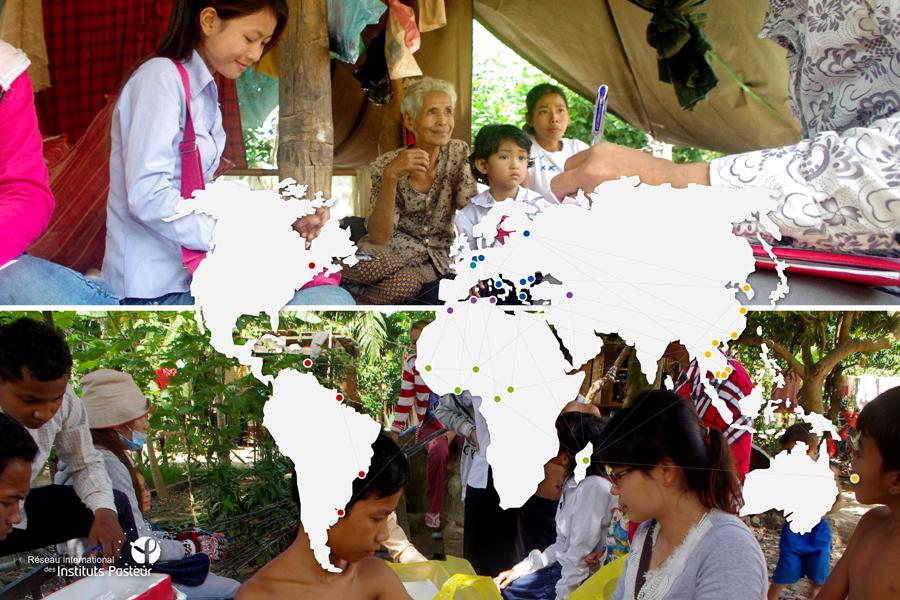
“For France, one institute (the Pasteur Institute) may be enough. For South America, Chile, Brazil, Australia…it is obvious that new scientists should be trained at the Institute in Paris, who will transfer their know-how to these distant lands”
~ Louis Pasteur
International network
The International Network of Pasteur Institutes and Associated Institutes (Reseau International des Instituts Pasteur et Instituts Associés) comprises 32 Institutes in all continents. Τhe Pasteur Institute in Paris (founded in 1888), has been the core for the development of this International Network.
For over a century, the contribution of the International Network of Pasteur Institutes essentially coincides with the history of discoveries that beaconed the development of the biomedical sciences and the struggle against some of humanity’s greatest health problems: The boubonic plague by Yersin, typhoid fever by Laveran, diphtheria by Roux and Ramon, tuberculosis by Calmette and Guerrin. Also, this contribution includes some of the early steps of molecular biology by A. Lwoff, J. Monod and F. Jacob and the isolation of the AIDS virus by J. L. Montagnier. Eight Nobel prizes, eight landmarks in the history of medicine.
Τhe Pasteur Institutes are all inspired by the same values in research, education and contribution to public health. In the field of public health, each Institute focuses on the fight of infectious diseases that primarily affect the respective host countries and neighbouring areas.
Equally important is the contribution of the Institutes of the Network to the epidemiological alertness for diseases on a global scale.
Mission
For more than a century, the International Network of Pasteur Institutes serves humanity through its activities in research and public health.
Τhe spectrum of research fields in which the Institutes of the Network specialize is quite broad, especially in tropical countries where infectious and parasitic diseases often take the form of epidemics.
Apart from their research activities, the Institutes of the Network function as national reference centres and sources of information and proposals for the formulation of health policies and the resolution of health issues at a local and national level. Their research activities vary from one Institute to another, but constitute a stable infrastructure for the entire network. They can be grouped in four major categories:
- Research related to diseases transmitted through bacteria, parasites or viruses. Communication and collaborations between Institutes of the Network allow the international scientific community to be up to date on health issues that concern specific parts of the world. Τhey also facilitate the transfer of technology to difficult environments.
- Providing public health services to the local community, as well as at the national level. These services include: applications of clinical biology and microbiology, food and water testing, immunization services etc.
- Reference Centres for infectious/contagious diseases which collect information at a national level and are linked to international institutions such as the World Health Organization. These centres play an active role in programs for fighting infectious diseases.
- Education and training, not only for the personnel of the Institutes, but also for the personnel of other institutions of health services, students and technicians, who in their turn transfer the acquired know-how to other Institutes of the Network and other local and national services and institutes.
Organization
Τhe Institutes belonging to the International Network of Pasteur Institutes (RIPIIA), function as independent entities but are interconnected through collaborations common regulations and bilateral agreements. A Charter of “Pasteurean values” and a Declaration of shared “Pasteurean values” have been adopted by all members of the Network.
Each Institute of the Network is managed by a Director General selected on the basis of his/her scientific and administrative abilities and often by an administrative Board. Admission of an institute as a member of the international network has to be approved by the Board of Directors of the International Network.
The Board of Directors, composed by the directors of all the member institutes and chaired by the Director General of the Pasteur Institute in Paris, meets twice a year and elects twelve representatives to the Assembly of the Pasteur Institute. A Vice-President is elected for three years. In these meetings, the directors are informed about progress or problems of joint programs of the International Network in which they participate and decide on the establishment of new exchanges and collaborations between institutes interested in the programs offered by the Network.
The Executive office of the Network, established in 2003, is chaired by the Vice-Chairman of the Board of Directors.
The RIPIIA has a common budget, each participating institution contributes 0.2% of its own budget. These common funds, managed by the Network’s Executive office, support the joint education, mobility of researchers and the implementation of scientific strategy. The Executive office is responsible for implementation and monitoring of programs funded by the common budget.
The organization of the Institutes is characterized by a flexibility, which permits their adjustment to local systems and needs; also, special characteristics are related to the founding and development of each Institute of the Network.
The scientific collaborations and the mobility of scientists within the RIPIIA Network is supported by a series of Pasteur Network programs mainly the ACIP and PTR grants as well as predoctoral fellowships.
